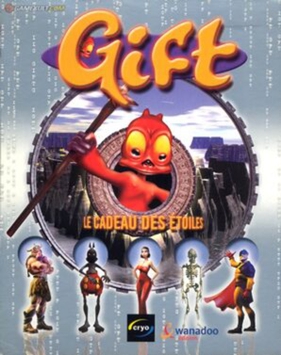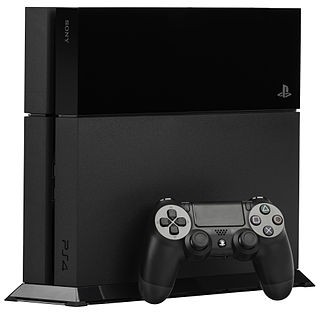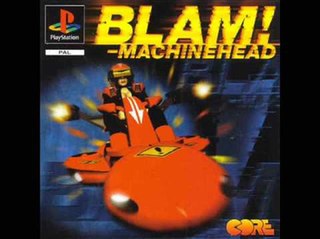
Æon Flux is an American avant-garde science fiction adventure animated television series that aired on MTV from November 30, 1991, until October 10, 1995, with film, comic book, and video game adaptations following thereafter. It premiered on MTV's Liquid Television experimental animation show, as a six-part serial of short films, followed in 1992 by five individual short episodes. In 1995, a season of ten half-hour episodes aired as a stand-alone series. Æon Flux was created by American animator Peter Chung. Each episode's plot has elements of social science fiction, biopunk, allegory, dystopian fiction, spy fiction, psychological drama, postmodern visual, psychedelic imagery and Gnostic symbolism.

Cryo Interactive Entertainment was a French video game development and publishing company founded in 1990, but existing unofficially since 1989 as a developer group under the name Cryo. The company gained recognition for its adventure games, such as the commercially successful titles Dune, Dragon Lore and Atlantis: The Lost Tales, along with the racing series MegaRace.
1997 saw many sequels and prequels in video games, such as Final Fantasy VII, Castlevania: Symphony of the Night, GoldenEye 007, Star Fox 64, Crash Bandicoot 2: Cortex Strikes Back, Quake II, Mega Man Legends, Riven, Tomb Raider II, Dark Rift, Tekken 3 and Virtua Striker 2, along with new titles such as Oddworld: Abe's Oddysee, Gran Turismo, Diablo, Grand Theft Auto and Fallout.
Actua Sports is a sports video game series published by Gremlin Interactive which competed with Electronic Arts EA Sports label during the second half of the 1990s, until Gremlin was acquired by Infogrames. The term "Actua" is a play on Sega's line of "Virtua" titled games, which included Virtua Fighter, Virtua Racing and Virtua Striker.

Moto Racer, mislabeled as Moto Racer Gold, is an arcade style motorcycle racing game developed by Delphine Software International and published by Electronic Arts for Microsoft Windows and PlayStation. The game was originally to be published by BMG Interactive, but after BMG closed down its U.S. operations it sold the publication rights to Electronic Arts. Critics hailed the game as the first outstanding arcade-style racer to appear on PC, and the PlayStation version in turn was called a strong conversion in reviews.

Madden NFL 99 is a football video game released for the PlayStation, Nintendo 64 and Microsoft Windows. It is the first multiplatform Madden game to be fully 3D and polygonally based and is also the first game to feature Franchise mode. The game's commentary is by John Madden and Pat Summerall. The American version of the game features John Madden himself on the cover, while the European version uses Garrison Hearst instead. The game was the top-selling PlayStation sports video game in 1998 in North America, having sold 1.1 million copies on the PlayStation.

Atlantis: The Lost Tales is a 1997 fantasy adventure video game developed and published by Cryo Interactive Entertainment. Interplay Productions published the game in North America, where it released on September 30, 1997. The game is named after its initial and most important setting, Atlantis. It is the first in a Myst-like series, and was followed by Atlantis II, Atlantis III: The New World, Atlantis Evolution and The Secrets of Atlantis: The Sacred Legacy.

F-1 World Grand Prix, developed by Paradigm Entertainment, is a Formula One racing game/sim first released in 1998 for the Nintendo 64 game console and to later platforms including the Sega Dreamcast, Microsoft Windows, Sony PlayStation, and Game Boy Color. The Nintendo 64 version is based on the 1997 Formula One season, featuring each of the 17 circuits from the season and all 22 drivers, with the exceptions of Jacques Villeneuve and the MasterCard Lola team.

Gran Turismo is a 1997 racing simulation video game developed by Japan Studio's Polys Entertainment and published by Sony Computer Entertainment for the PlayStation. It was directed by Kazunori Yamauchi and produced by Shuhei Yoshida. It is the first game in the Gran Turismo series.

NBA Live 97 is the third installment of the NBA Live video games series. The cover features Mitch Richmond of the Sacramento Kings. The game was developed by EA Sports and released in 1996. The MS-DOS, Sega Saturn and PlayStation versions featured polygonal models for the on-court players, thus marking it as the first 3D EA Sports Basketball sequel for the series. It was also the first NBA Live released for the Sega Saturn. The game received mostly positive reviews for its advanced graphics and wide array of available moves and plays, though the Saturn conversion was reviled for numerous technical deficiencies. NBA Live 97 is followed by NBA Live 98.

The PlayStation 2 (PS2) is a home video game console developed and marketed by Sony Computer Entertainment. It was first released in Japan on 4 March 2000, in North America on 26 October 2000, in Europe on 24 November 2000, and in Australia on 30 November 2000. It is the successor to the PlayStation (console), as well as the second installment in the PlayStation brand of consoles. As a sixth-generation console, it competed with Nintendo's GameCube, Sega's Dreamcast, and Microsoft's Xbox. It is the best-selling video game console of all time, having sold over 155 million units worldwide, nearly triple the combined sales of the Dreamcast, GameCube, and Xbox.

Everybody's Golf, known in North America as Hot Shots Golf and in Japan as Minna no Golf, is the first game in the Everybody's Golf series. It was the only game in the series to be developed by Camelot Software Planning, which later developed the Mario Golf series.

Gift is a platform game developed by French studio Eko Software that parodies elements of popular adventure games. It was created by Cryo Interactive's creative director Philippe Ulrich and by author, cartoonist and illustrator Régis Loisel. The game is set over ten levels in a full 3-D world.

360: Three Sixty is a 1999 futuristic racing game for the PlayStation console, released in Europe, and was developed by Smart Dog and published by Cryo Interactive. The game is set in a world submerged beneath water, where hover ships are used for racing and the players use lethal weapons to take down their opponents.

The PlayStation 4 (PS4) is a home video game console developed by Sony Interactive Entertainment. Announced as the successor to the PlayStation 3 in February 2013, it was launched on November 15, 2013, in North America, November 29, 2013, in Europe, South America, and Australia, and on February 22, 2014, in Japan. A console of the eighth generation, it competes with Microsoft's Xbox One and Nintendo's Wii U and Switch.

Virus: It is Aware is a 1999 action-horror video game developed and published by French video game developer Cryo Interactive. It was released on PlayStation in Europe, and localised for France, the UK, Germany, Spain and Italy. The game is a tie-in for the 1999 comic book film Virus based on the comic book from Dark Horse Comics.

Kick & Fennick is a platform video game developed and published by Dutch indie studio Jaywalkers Interactive for PlayStation Vita. It was released in North America on 3 February 2015 and in Europe the following day. The game was also released free for PlayStation Plus members. On 28 January 2016, Abstraction Games announced on Twitter that they are bringing the game to Nintendo's Wii U. The two companies announced that the game will be released on the PlayStation 4, Wii U, and Xbox One in June 2016.

Blam! Machinehead is a first-person shooter developed by Core Design and published by Eidos Interactive in North America and in Japan by Virgin Interactive Entertainment, and was released for Sega Saturn, MS-DOS, and PlayStation in 1996.

Syyrah: The Warp Hunter is a 1997 game developed by Pixelstorm and published by Sun Corporation.

















